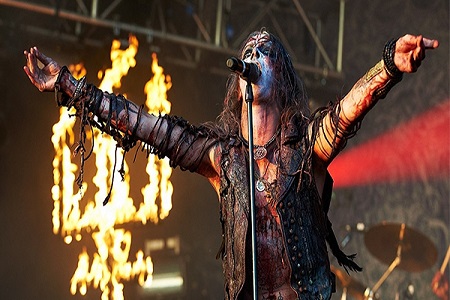Dead Rhetoric: As for the new album, everyone is pointing to the song “They Rode On” as a significant development for the band. Is that in your estimation, a prime example of how there are no boundaries in Watain?
Danielsson: It’s always the plan when we translate something into music that we haven’t been able to before. In this particular case, it was a set of emotions that have been very…dormant, or constantly present within the band for all these years. We’ve been on a very stable and solitary path, and that is something I think we have been able to get our minds around just now in translating that into music. We managed finally, and it’s definitely an achievement I’m proud of. Not only because of how well it turned out, but because we dared to take that step. It pleases me to see that most people grasp that instead of we’re trying something else for the sake of whatever. Most people seem to see that this is a deeper side into the world of Watain.
Dead Rhetoric: In doing that kind of regular singing in key, is that something you’ve been working on?
Danilesson: I didn’t have to work so hard. It’s always hard to do work for an album, but technically speaking, it wasn’t that hard, to be honest. It’s very much about letting go and just opening yourself. It didn’t take hours and hours of practice, but all that was somewhere inside me and I had to let it out.
Dead Rhetoric: I don’t want to call something like “Sleepless Evil” “traditional” Watain, but then you have something like “The Child Must Die” which is incredibly immediate. Was finding that balance, in addition to a song like “They Rode On” a priority this time out?
Danielsson: It was more of a matter of imbalance [laughs]. Just untying all the knots and opening up every door and window of Watain and seeing what comes in and what comes out. We planned very little for this album – it’s very diverse and that was one of the things we were worried about, but it was something we worked quite hard on in the studio trying to get more coherence. We actually didn’t have to work too hard – it’s one of those things that just happen naturally in the studio. We have a wide variety of songs; there’s still something happening in the studio that ties everything together.
Dead Rhetoric: And the melodic stuff is still there, too. Are you getting more attuned to how well it works in your songs?
Danielsson: It’s very much about how feel what’s best for the moment. This time around, there were certain things that needed to be expressed with melody and a calmer approach to writing. Who knows, maybe the next album is a 60-minute long track with one riff [laughs]. It’s always a matter of doing exactly what we need to do at that moment in time. That’s why things are stand-alone in their nature – they’re a reflection of that moment in time.
Dead Rhetoric: What’s your take on people who think bands have to stay within certain parameters to be black metal?
Danielsson: I very much agree with them. To the extent of that to me, it’s not a matter of staying true to a musical spine; that spine is one rather of atmosphere and ideology rather than a musical one. And that’s what defines Watain. Black metal music is music that in essence, is diabolical and has diabolical energies and that is where the definition lies to me. Incorporating elements like keyboards…it only takes away from the diabolical aspect of it, because we’re talking about the wild, the untamed, ferocious, predatory aspect of it, the tribe within this music. You cannot really get into that permutation with those things if you have a sound that opposes those things.
Dead Rhetoric: In North America, we have a lot of what is called “Cascadian” or post-black metal bands who don’t look the part whatsoever. Have you caught wind of them?
Danielsson: I haven’t caught their wind – I stay out of that wind as much as I can [laughs]. I’m in my own world with Watain. What I can say with black metal is that it’s as much about ideology and spiritually and if those things are real, they’ll reflect in everything else. Especially aesthetics and the way people appear. For me, the concept of performing black metal in jogging pants and jogging shoes and a Cannibal Corpse t-shirt is impossible; it’s not meant to be that way. To me, it’s an art form that demands everything. If you want to be in a black metal band, you take yourself as an adversary of society, because that’s what black metal is. That has to go beyond just playing songs. That has to reflect on every aspect of your life if you really want to place your focus on this movement. So yeah, that’s my advice [laughs].
Dead Rhetoric: You spent time in Dissection as a touring member when Jon [Nodveidt] reactivated the band. What do you remember about that time?
Danielsson: I could write a book about that. Let me say about this: Some years of life always determine how the rest of your life is going to be, and those years definitely were those in my life. It changed everything. It made me make a lot of very important decisions and it made me realize what is important and the road I’m on…what those things are and what those choices are, they’re for another time. But, no one could go through those experiences without looking back upon them as life-altering.


